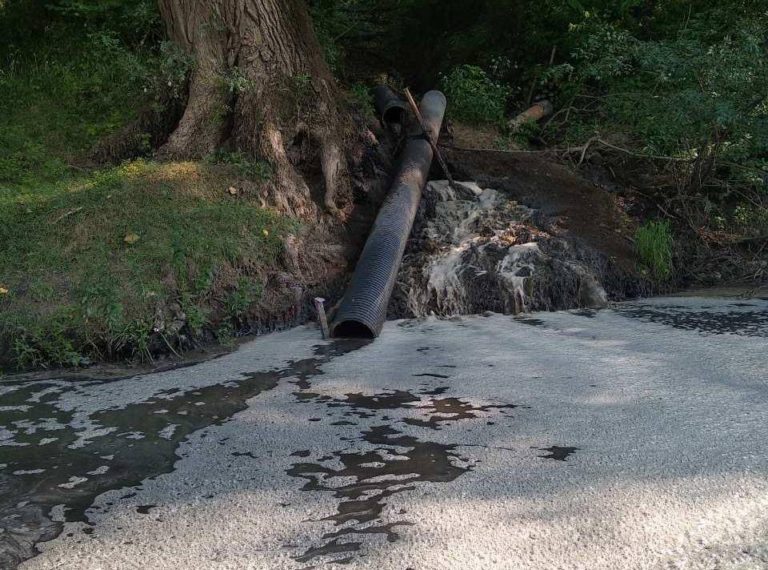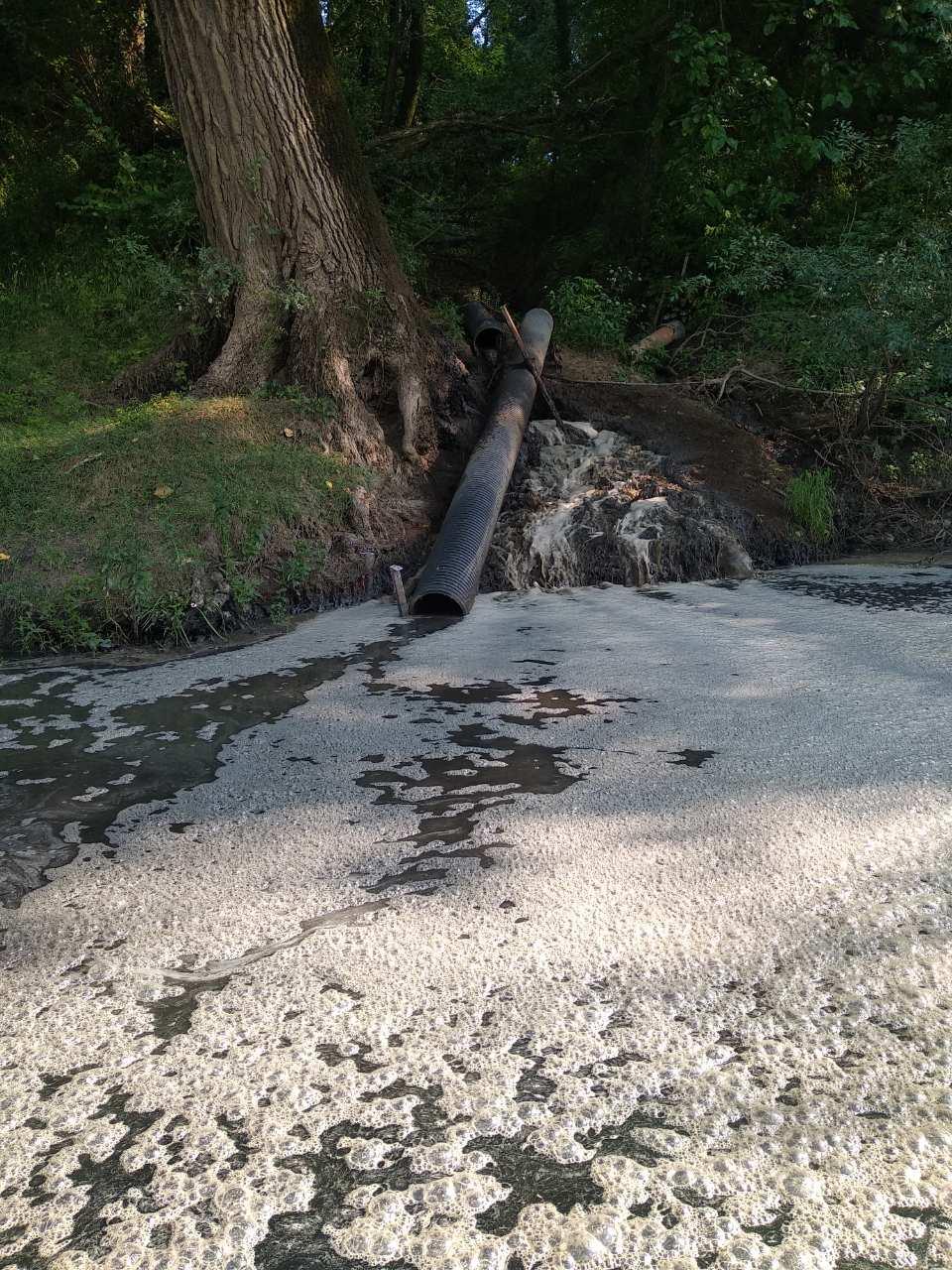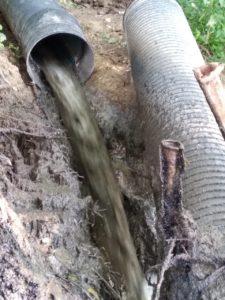RIVER ZETA ON VERGE OF COLLAPSE BECAUSE OF POLLUTION, LOCALS FEAR: From potable water to perilous water

The “very bad status” which Montenegro’s Hydrometeorological Office gave to the River Zeta after examining the water is a mild description of the level of pollution which is causing locals to fear that they will fall ill more often. Experts claim that the institution and polluters are working together
Residents of the village of Grbe near Spuž are thinking of leaving their properties and looking for a less dangerous area. They want what they consider their birth right – the right to clean air, water and food.
“The right to live, nothing else,” says local Goran Đuričković.
Their ancestors divided the land up between their heirs so that each would receive a piece that bordered the river. This is why the properties along the Zeta are mainly long and narrow.
This 86-kilometre-long tributary of the River Morača and part of the Adriatic Basin is fed by waters from the north of the country which flow into Nikšić Field. This water, filtered in the womb of the earth, reappears at the place known as Glava Zete. Once rich in fish and plant life, the lower flow, instead of being a source of life, has become a dangerous channel into which wastewater drains from numerous companies. The fish stocks are almost totally destroyed and the locals fear that their health is threatened.
“We asked the Institute of Public Health of Montenegro to carry out health checks on people from that area, because for several years now we have had a high mortality rate from carcinomas, which wasn’t the case in earlier years. The Institute informed us they cannot make any decision on this for now because of their increased workload in light of the coronavirus epidemic,” said Đuričković for the Centre for Investigative Journalism of Montenegro, the Balkan Investigative Reporting Network and Monitor (CIN-CG/BIRN/Monitor).
The Institute did not respond to questions about whether they ever intend to investigate the claims of the locals from Grbe, nor why this has not yet been done.
An investigation carried out by CIN-CG/BIRN/Monitor has shown that those who are responsible for the state of the water are, first and foremost, the Water Authority, the Agency for Environmental Protection, the Inspection Service and the government departments which allow the functioning of serious polluters, even though those companies often do not have ecological compliance, water permits or other proofs about the quality of the matter they discharge into the river and the effect they have on the environment.
The Water Authority does not yet have a register of polluters. A CIN-CG/BIRN/Monitor journalist confirmed that wastewater is in fact coming out of the discharge pipes of companies which have not been issued permission by this body.
Laboratories without equipment
A specialist veterinary laboratory in October of last year examined fish that had been caught in the River Zeta. After cooking them, they confirmed “an unpleasant smell uncharacteristic of that species of fish”.
Examinations by the Water Quality Department of the Hydrometeorological Office of Montenegro (HMZCG) during 2019 showed that the Zeta had very poor physical and chemical characteristics. The last time an analysis was carried out was in November of last year.
“The waters of the Rivers Morača, Bojana, Ćehotina and Zeta had the status of ‘very bad’. The waters of the Cijevna, Gračanica, Lim, Lješnic, Ljuboviđa and Ibar had the status of ‘bad’, and this is in parts of the lower flows,” it is recorded in the analysis. It also shows that the Zeta has fewer invertebrates, which are sensitive to a polluted environment! Samples were taken “in the region of the confluence of the Zeta and Morača, at Vranjske njive”.
The HMZCG was not able to give an answer about how the “very bad status” is reflected in the fish stocks and agricultural produce from the meadows which are irrigated from the river and, hence, in the health of the local population.
“The Office is not technically equipped for this sampling and analysis work. But these examinations will have to be carried out by equipping the laboratories of the Office or by employing other laboratories,” said Nevenka Tomić, the head of the Department for Water Quality in the HMZCG for CIN-CG/BIRN/Monitor.
The Agency for Environmental Protection has, however, recorded the sources of pollution which affect the fish stocks: “communal wastewater, mainly laden with organic material, a pig farm, a chicken farm, Lazine Dairy, a slaughterhouse and an urban settlement”.
And a CIN-CG/BIRN/Monitor journalist, paddling a canoe along the Zeta on 16 July from Danilovgrad Bridge to the place Grbe, noticed a large number of pipes from which waste was being discharged into the river.
Besides the discharge from urban sewerage, there are also pipes from the Mermer and Šišković stone quarries, Lazine Dairy, Monte Bianco cheese factory, Primato-P slaughterhouse, Neksan-Čavor pig farm and the Administration for Criminal Sanctions...
From the majority of discharge pipes the wastewater made the river cloudy and an unpleasant smell emanated from it.
That day there was no wastewater from the outflows of the companies Primato-P and Eurozox, which there had been in the previous period. (Video: Iz prošle godine gdje se vidi da iz ovih kompanija stižu otpadne vode)
Permits expired, companies working
It is precisely because of these or even more alarming images recorded last year that the locals of Grbe were protesting for months.
“As children we did not go to springs or houses, we drank straight from the Zeta. Today we cannot go near the river, it is so polluted, let alone go for a swim in it or drink from it,” says Đuričković.
He and his neighbours complained because of the unbearable stench coming from near the pig farm, but also because of the wastewater coming from the farm and the Primato-P slaughterhouse next door.”
In October of last year, the locals also submitted a criminal complaint against Dragan Čavor, the owner of the company Niksen-Čavor, claiming that his farm was polluting the environment. The Basic State Prosecution in Podgorica found that “there are no grounds for undertaking criminal prosecutions against any person, for any criminal offence for which he/she may be prosecuted ex officio”.
“Our system does not protect… We are asking for the law to be applied to every business,” Đuričković states.
The law states that every company that could affect the ecosystem of the Zeta must possess a system for cleaning up wastewater, as well as a water permit. A study is also supposed to be carried out regarding the effect on the environment, for which consent, depending on the jurisdiction, is given by the Agency for Environmental Protection or the local government organ.
The Water Authority told CIN-CG/BIRN/Monitor that, out of all the businesses whose outflow pipes discharge into the Zeta on the territory of Danilovgrad, only the Mermer and Šišković stone quarries, Zeta Energy, Senca, Eko Petrol and Jugopetrol have water permits. They obtained them for a period of 10 years and they are still currently valid.
The companies that are causing Grbe’s locals to complain – Niksen-Čavor and Primato-P slaughterhouse – do not have permits to discharge wastewater into the Zeta. At the end of May 2018 they obtained temporary permits which are no longer valid.
“The aforementioned temporary water permits were issued for a period of 12 months and expired on 31 May 2019,” the Water Authority informed us.
The owner of the pig farm, Dragan Čavor, claimed to CIN-CG/BIRN/Monitor that they no longer have to have a water permit because since December 2019 they have not discharged “even a drop of wastewater” into the Zeta. Now, he says, there is a separator in use, which separates out waste into solid waste and water, which they use for irrigation.
“Since we do not discharge water into the Zeta, there is no need for us to have a water permit”, Čavor explains.
However he had no answer to the question of who it was, then, that discharged wastewater into the Zeta in Grbe on 16 July of this year. This was confirmed by the CIN-CG/BIRN/Monitor journalist who took the video footage. In the place where wastewater had earlier been discharged from the pig farm and the slaughterhouse, a brownish liquid was flowing out, with a strong smell of pig faeces.
“Morally, materially and before the law, I claim that this wastewater does not come from the farm – where it does come from should be ascertained by the competent institutions. It is not technically feasible, because our outflow was concreted up in the presence of the water inspector,” claims Čavor.
During January and February of this year the water inspection checked the pig farm’s work twice and confirmed that the rules were being followed.
Who to believe – the owners or one’s own eyes?
Biologist Vuk Iković, however, claims that uncleaned wastewater containing animal faeces and urine is still being discharged into the Zeta.
“Knowing the activity of the surrounding businesses, this wastewater originates from either the Primato-P slaughterhouse or the pig farm, or both businesses,” says Iković, explaining that this is occurring mostly because of incorrect handling of animal waste.
“At this moment the pig farm is not polluting the environment in terms of wastewater. Everything we were ordered to do last year we have done,” says Čavor.
That the Primato-P slaughterhouse has continued discharging wastewater into the river without a permit, which expired in May of last year, is also confirmed to the CIN-CG/BIRN/Monitor journalist by the owner Panto Vučurović.
“If an investor does not have a water permit, it cannot begin to function. If an investor does not have a water or ecological permit, but still carries out its activities, it is the same as if you drive a public bus service and do not have a driving licence,” says Iković.
In order for someone to obtain a permit, according to him, he has to prove that wastewater from the production process will not affect the quality of the river. For this reason, he says, it is very important that the competent institutions have qualified officers who will be able to assess all the data which the investor submits.
When asked who is responsible for the fact that some companies can discharge wastewater into the river without a permit, the Water Authority points its finger at the business owners:
“It is the entrepreneur, or person who carries out the activity and does not put into effect the measures stipulated by law. However, when it is determined that the law or another rule has been violated, or that standards and norms are not being followed, the water inspector takes institutional measures and actions in line with Article 163 of the Law on Water Resources.”
In that article of the law it states that the inspector would also be able to prohibit a company from working if it does not have the necessary water permit.
In the last four years the work of the Primato-P slaughterhouse has been temporarily suspended for the reason that the wastewater had a concentration of harmful matter greater than the maximum allowed level.
During one of the last inspections of the slaughterhouse on 29 May, inspectors determined that there was no device for measuring the quantity of water discharged into the Zeta.
The slaughterhouse owner Panto Vučurović, in a telephone conversation on the eve of the publication of this investigation, claimed that the device was recently installed, so they are waiting for the competent inspector to go to the field to determine the factual situation.
In fact, the fact that they do not possess this device and the fact that it is not clear who manages the communal drains for atmospheric runoff (into which many companies’ wastewater drains) are the reasons why, according to Vučurović, they do not have a water permit. The application for obtaining that document will be submitted when all the conditions are satisfied.
Although Vučurović claims that their water treatment system is functioning and that only treated water is discharged into the Zeta, in February of this year the inspection determined that blood was flowing into the river from the slaughterhouse. A fine of €1,400 was issued to the responsible individual in the company Primato-P for this.
A blind eye turned to polluters
During 2018 and 2019, no one from the territory of Danilovgrad submitted data on the discharging of polluting matter to the Agency for Environmental Protection even though they were obligated to do this by the Law on the Environment and the Rulebook on the Detailed Content and Manner of Maintaining the Cadastre of Environmental Polluters.
“The two biggest polluters – Niksen-Čavor pig farm and Lazine Dairy – do not have ecological compliance. For this reason alone, they were not allowed to begin working, but for years they have been using the River Zeta as a place to dump their waste,” says Iković.
In an interview with CIN-CG/BIRN/Monitor, Dragan Čavor said that a process was underway before the competent authority of the municipality of Danilovgrad, after which it would be known whether it was necessary to make a study on environmental impact assessment.
The dairy responded for CIN-CG/BIRN/Monitor, saying that since 2003 they have had ecological compliance issued on the basis of an assessment of the effect on the environment, which was also undertaken 17 years ago. Iković, however, claims that the dairy must carry out a new study. The new Law on Assessment of the Effect on the Environment from 2008, he says, is now in effect and the dairy has exceeded the capacities stated in the old study.
In the opinion of this biologist, the dairy’s document from 2003 was not valid either: “The content itself is such that the processor of the documentation and the responsible person who gave consent for this document should be processed, because they allowed the Zeta to be poisoned from the moment the dairy began to work.”
For this reason, he says, the failure to solve this problem “points to cooperation between the institutions and the polluters”.
“This says that the primary polluters are the institutions, because they are paid to guarantee a healthy environment and the health of the citizens,” says Iković.
An interlocutor from one of the government services, who is aware of events in this field, points to the lack of water cadastres – among which would also be a cadastre of polluters – as the biggest problem.
“There is no information system yet. The water authorities are at fault for this,” he says.
According to the Law on Water Resources, in Article 159, it states that “the water information system (…) is established and maintained by the competent administrative body”, in this case the Water Authority.
Our interlocutor notes that these “information systems”, i.e. the list of polluters, are essential for the inspection body to go out onto the field and check anyone who is potentially polluting the rivers.
“A cadastre of polluters is the basis for the work of the inspector. Without that list they can work only on the basis of complaints, but if they examine the terrain then they will come across polluters. However, all polluters need to be recorded so that the inspectors can know whom to monitor,” CIN-CG/BIRN/Monitor’s source states.
Besides the lack of cadastres, he notes that “those who issue work permits often neglect to make sure that businesses submit to them all the necessary documentation”. So, it often happens, he says, that someone begins to work without having all the necessary permits – a water permit or even a water treatment system.
“Either the officials are abusing their position, or are not getting too involved,” he says.
What’s left is cleared up by poachers
What the polluters haven’t done to the Zeta, poachers have, say CIN-CG/BIRN’s interlocutors.
The river is home to the softmouth trout, an endemic and protected species in Montenegro.
Thirty-five years ago, according to ichthyologist Danilo Mrdak, this was the most abundant type of trout in the Zeta.
“Now we can only hope that as many as a few hundred of this fish remain. For six years we have failed to catch one, and I have not heard of any angler managing it either,” says Mrdak for CIN-CG/BIRN/Monitor.
The vice president of the Municipality of Danilovgrad, Ilija Grgurović, speaks worriedly about what is happening to the Zeta. He claims that “poaching is also blossoming nowadays”.
“This fish is in such a bad state that it is facing extinction,” says Grgurović.
The business association “For the Breeding, Protection and Hunting of Game and Fish” Danilovgrad, which should be looking after the fish stocks, notes Grgurović, has five employees, of which three are poorly-equipped game wardens, on the verge of retirement.
“They were not up to the task… We have not succeeded in prosecuting a single poacher for years now… We cannot get hold of data on how many poachers there are, but there are definitely too many… There are poachers, but we have no proof. Only alerts and reports,” says Grgurović.
Mrdak claims that fish in the Zeta are threatened due to poachers and poor monitoring by the competent authorities.
“Truth be told, the common nase has appeared again, there are a lot of chub and also eels, but with the state of crayfish and marble trout, and especially softmouth trout, it is time to sound every possible alarm if we want to continue to have them in the Zeta,” says Mrdak.
In December 2019, after the “Study of the Protection of the Protected Natural Resources of the River Zeta” was produced, it was decided that fishing would be banned on the river except around the bridges in Danilovgrad and Spuž. It will be like this for the next three years.
Nemanja ŽIVALJEVIĆ






